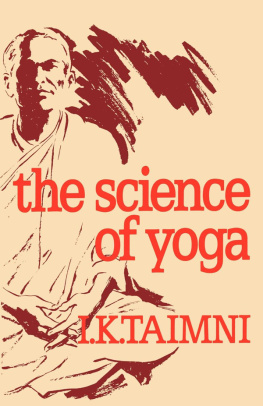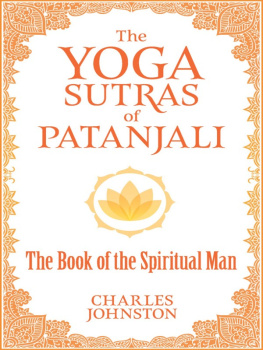Yoga Sutras
An Essential Guide to Understanding the Yoga Sutras of Patanjali
Copyright 2020
This document is geared towards providing exact and reliable information regarding the topic and issue covered. The publication is sold with the publisher being not required to render accounting, officially permitted, or otherwise, qualified services. If advice is necessary, legal or professional, a practiced individual in the profession should be ordered.
From a Declaration of Principles accepted and approved equally by a Committee of the American Bar Association and a Committee of Publishers and Associations.
In no way is it legal to reproduce, duplicate, or transmit any part of this document in either electronic means or in printed format. Recording of this publication is strictly prohibited and any storage of this document is not allowed unless with written permission from the publisher. All rights reserved.
The information provided is stated to be truthful and consistent, in that any liability, in terms of inattention or otherwise, by any usage or abuse of any policies, processes, or directions contained within is the solitary and utter responsibility of the recipient reader. Under no circumstances will any legal responsibility or blame be held against the publisher for any reparation, damages, or monetary loss due to the information herein, either directly or indirectly.
Respective authors own all copyrights not held by the publisher.
The information herein is offered for informational purposes solely, and is universal as so. The presentation of the information is without contract or any type of guarantee assurance.
The trademarks used are without any consent, and the publication of the trademark is without permission or backing by the trademark owner. All trademarks and brands within this book are for clarifying purposes only and are owned by the owners themselves, not affiliated with this document.
Your Free Gift
Thanks for downloading this book ! If you want to learn more about various spirituality topics, then join Mari Silva's community and get a free guided meditation MP3 for awakening your third eye. This guided meditation mp3 is designed to open and strengthen ones third eye so you can experience a higher state of consciousness.
Click here to download the free guided meditation MP3 for awakening your third eye
Table of Contents
Introduction
Let's play a game. I will ask a clich question. You have only to give two answers. One now and the other at the end of this introduction, right before you delve deeper into this book's chapters. My question is simple. Are you happy?
Say things turned out the way they should, you snagged that promotion, made partner, or your check is fatter than it used to be a year ago. Or maybe your relationship is going well (or you found your feet after a toxic partnership fell flat), and your body mass index is ideal, you would say yes, wouldnt you?
What if I told you that absent these things, you could still be happy? Say the coin was flipped and you had less than a dollar to your name. Say your weighed down by student loans, or youve lost a loved one, or you're terrified of looking at your reflection in the mirror for fear you won't like what you see. It's crazy to think you'd still be happy, right?
In life, we depend on a lot of external factors for happiness. These factors are temporary and are as unpredictable as the stock market. Because of our lack of awareness, we live our lives trapped in a rat race for success, happiness, and all other means of gratification, most of which aren't personally defined by us. While we exist instead of living, life ebbs away. We search endlessly for the next trip, forgetting there is a path to bliss one that isn't short-lived a course full of purpose, joy, and meaning regardless of life's circumstances.
Yoga is a tested and trusted practice, not just for health and flexibility (although that is a bonus), but for personal development and spiritual awakening. A compilation of 196 aphorisms known as sutras contain lessons put together over two thousand years ago by a sage named Patajali ( ).
These sutras are divided into four chapters, each outlining nuggets of spiritual wisdom, some of which have clear cut lessons. In contrast, others are more complex with a slightly different meaning depending on who you ask. All chapters were treated in this book. The lessons in each chapter are kept simple without drifting away from the original content and underlying message.
I can guarantee you a fun, inspiring read. Yoga does more than make you sweat, breathe easier, and have you shopping for trendy sportswear. Practice yoga long enough, and you gain certain superpowers none of which are to be used selfishly, I warn. Some other things you will learn in this text include but are not limited to:
How to find your center, so you don't experience life like a kite at the mercy of the winds;
How to become attuned to the subtle language of your body, because like it or not, your body communicates with you more often than you realize;
How to improve your levels of concentration and silence the inner ramblings of your mind;
How to observe and react objectively, guiding your perception towards that which is fair and trustworthy.
Do I have your attention now? How badly do you want to turn the page? Before you do so, I ask again: Are you happy? If you are, then read this just for kicks. Read it for the same reason if you are undecided. You may just discover happiness in one (or all) of these pages. I hope you stay enthralled until you get to the end of the very last chapter. Namaste!
Chapter One: Introduction to Yoga Philosophy
Humble Origins
The word "Yoga" originated from the Sanskrit word "Yuj," which means "to unite," "to yoke," or "to join." In Yogic scripture, practicing yoga initiates a harmony or equilibrium between individual awareness and universal consciousness, leading to a perfect balance between the body, mind, man, and nature.
This harmony of existence defines the integration of human persona at the highest level, which is why genuine yoga practitioners are said to have reached a frame of mind known as "Nirvana," "Mukti," or "Moksha," all of which are states of emancipation or release.
Yoga is a psychosomatic spiritual instruction focused on health, harmony, and overcoming all states of human suffering and pain to regain mastery of our destiny. Maharishi Patanjali describes yoga as the art of suppressing the modifications of the human mind to attain complete self-realization.
The Philosophy of Yoga
In Indian culture, the word for philosophy is "Darana," from the Sanskrit word "Drish," meaning "to experience or see." Yoga is a spiritual practice entrenched in ancient Indian wisdom, thought, and life. Yogi daranas instruct us to see life as it is, living life so the equilibrium of mind and body easily comprehends the truth. The six yoga philosophies are intertwined with each other to form an impressive philosophical system known as the Shad Darana, and they are:
Nyya or Judgment or Logic (Sanskrit ): The sage Aksapada Gautama was a proponent of yoga from a multidimensional perspective, one which lends itself to logic and holds up the ideals of the right practices, rules, and judgment. There are four ways to get knowledge:
Through inference, or Anumna (Sanskrit: ),
Through testimony or word, also known as abda (Sanskrit: )
Through evidence and observation, or Pratyaka (Sanskrit: ), and














